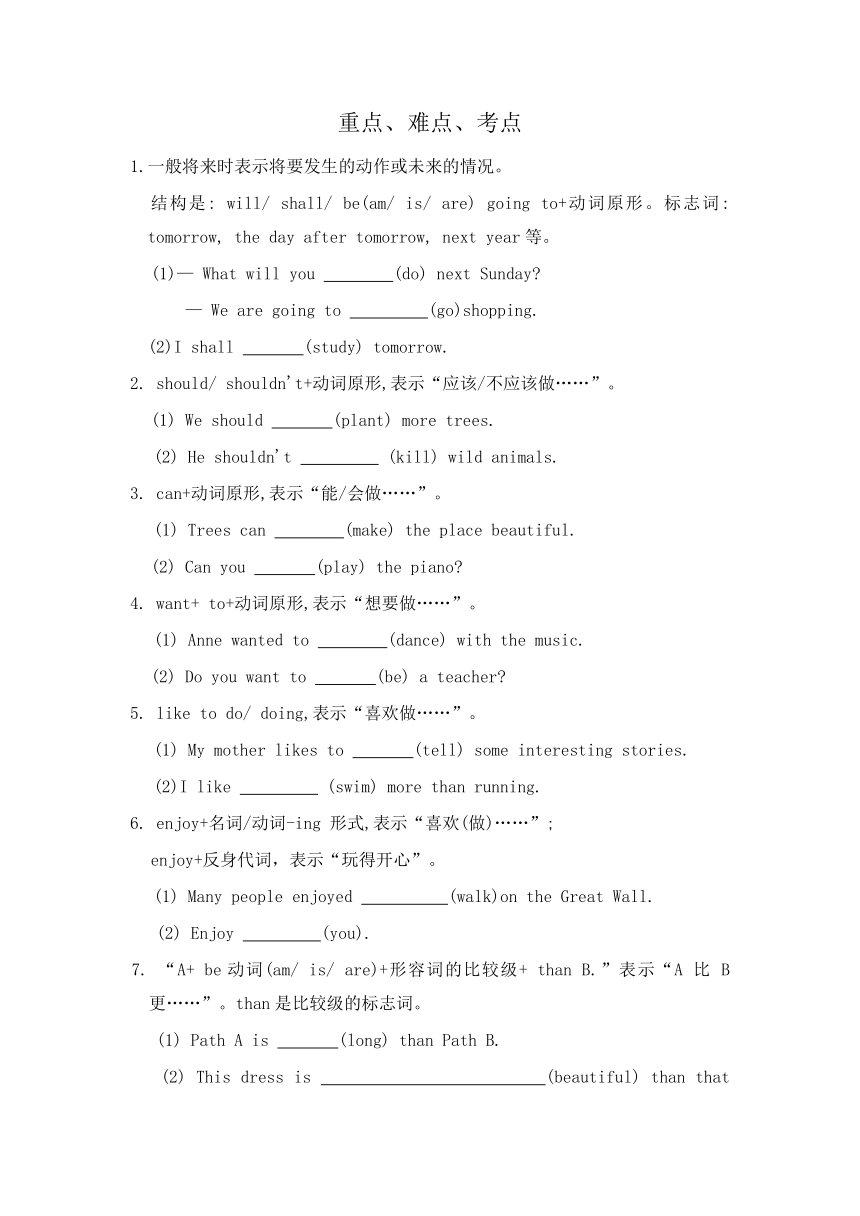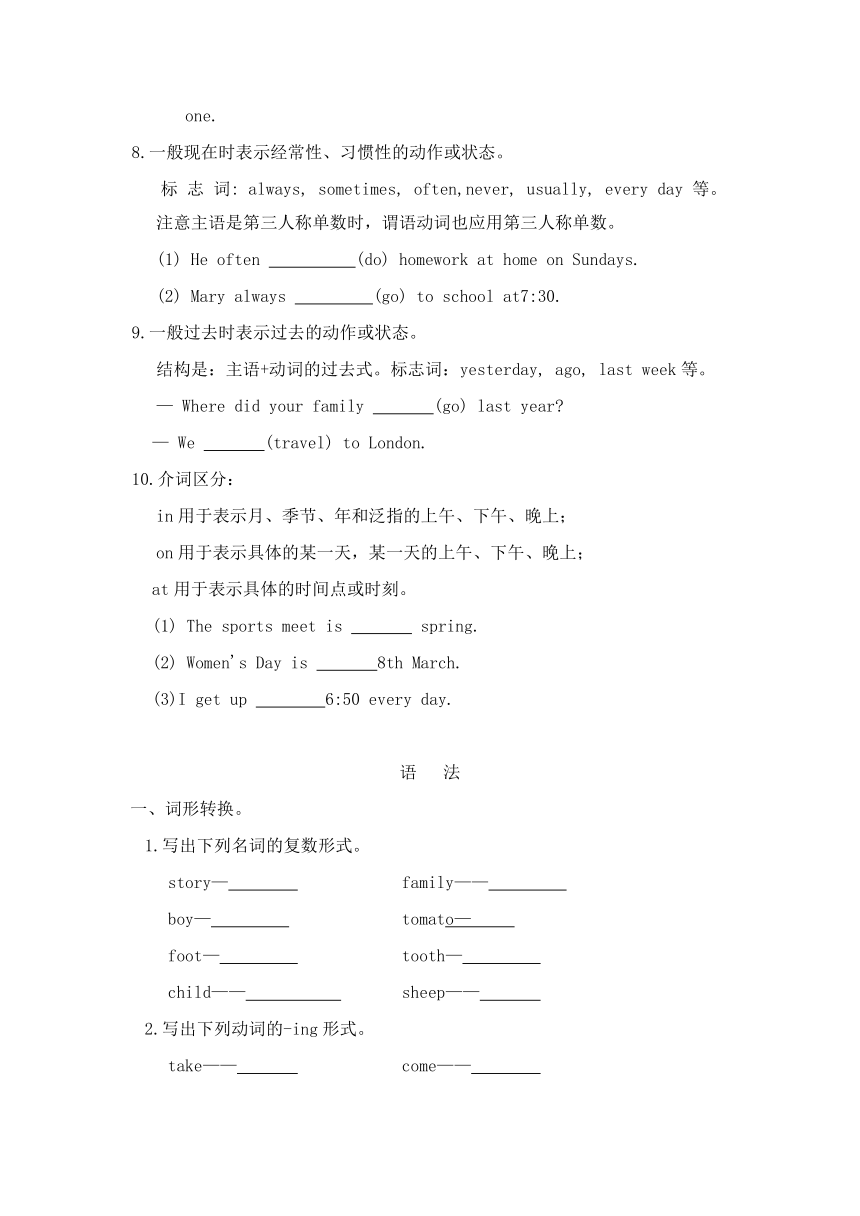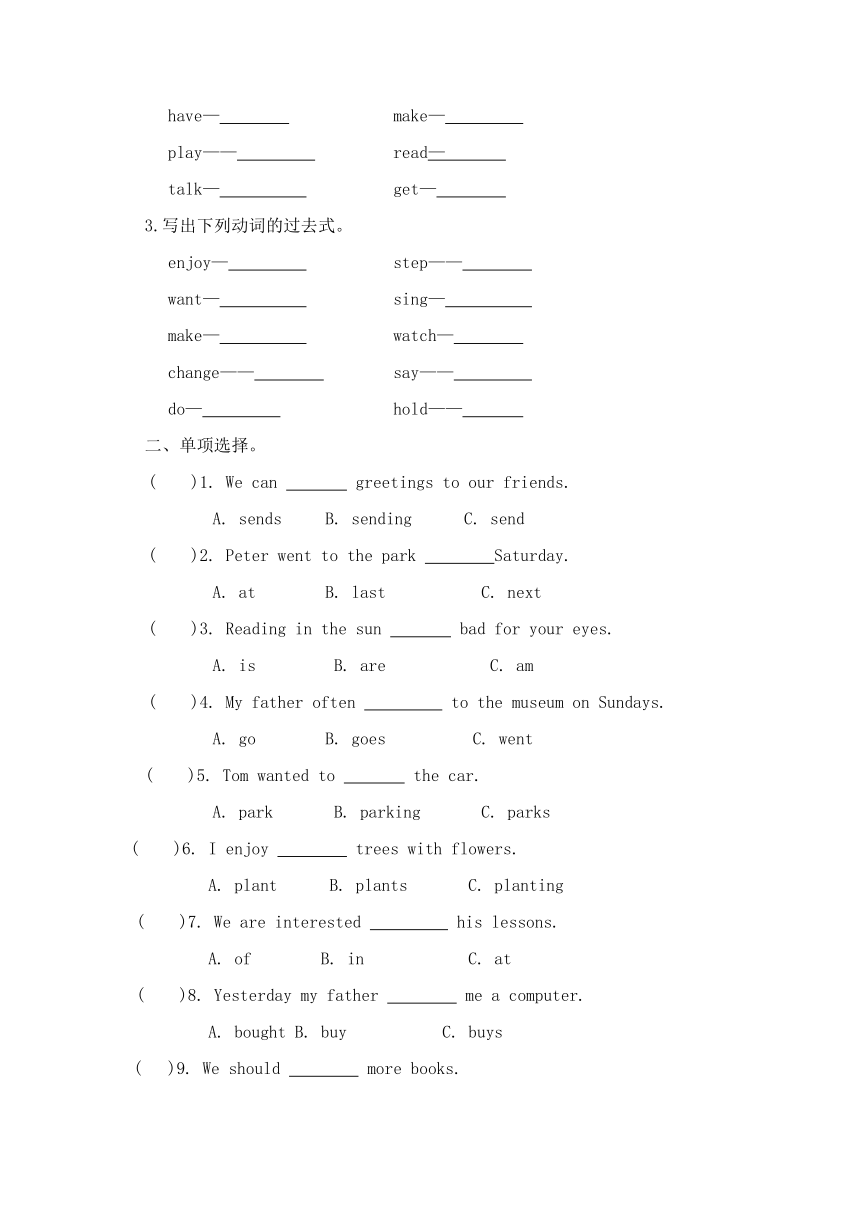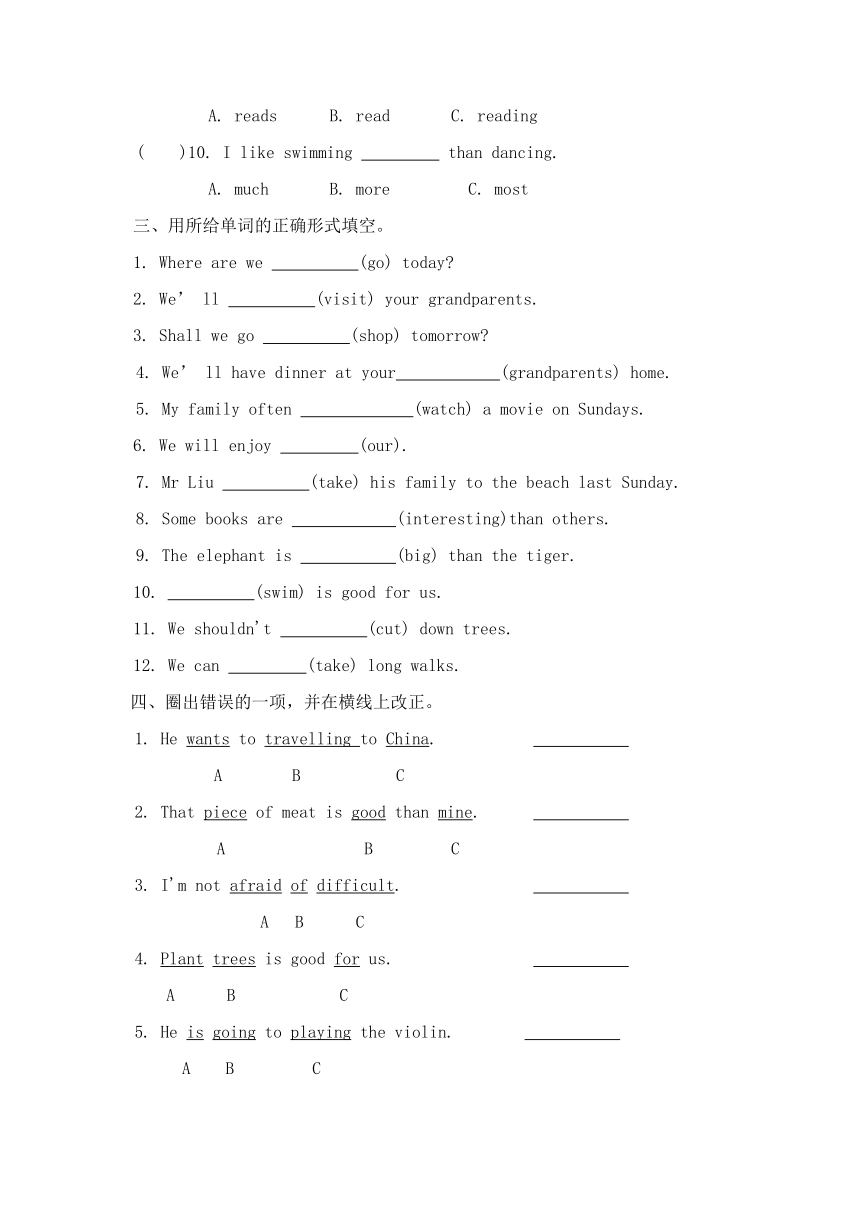期末重点、难点、考点、语法复习试卷2024-2025学年湘少版英语六年级下册(含答案)
文档属性
| 名称 | 期末重点、难点、考点、语法复习试卷2024-2025学年湘少版英语六年级下册(含答案) |  | |
| 格式 | docx | ||
| 文件大小 | 67.4KB | ||
| 资源类型 | 教案 | ||
| 版本资源 | 湘少版 | ||
| 科目 | 英语 | ||
| 更新时间 | 2025-04-29 20:30:16 | ||
图片预览




文档简介
重点、难点、考点
1.一般将来时表示将要发生的动作或未来的情况。
结构是: will/ shall/ be(am/ is/ are) going to+动词原形。标志词: tomorrow, the day after tomorrow, next year等。
(1)— What will you (do) next Sunday
— We are going to (go)shopping.
(2)I shall (study) tomorrow.
2. should/ shouldn't+动词原形,表示“应该/不应该做……”。
(1) We should (plant) more trees.
(2) He shouldn't (kill) wild animals.
3. can+动词原形,表示“能/会做……”。
(1) Trees can (make) the place beautiful.
(2) Can you (play) the piano
4. want+ to+动词原形,表示“想要做……”。
(1) Anne wanted to (dance) with the music.
(2) Do you want to (be) a teacher
5. like to do/ doing,表示“喜欢做……”。
(1) My mother likes to (tell) some interesting stories.
(2)I like (swim) more than running.
6. enjoy+名词/动词-ing 形式,表示“喜欢(做)……”;
enjoy+反身代词,表示“玩得开心”。
(1) Many people enjoyed (walk)on the Great Wall.
(2) Enjoy (you).
7. “A+ be动词(am/ is/ are)+形容词的比较级+ than B.”表示“A 比 B 更……”。than是比较级的标志词。
(1) Path A is (long) than Path B.
(2) This dress is (beautiful) than that one.
8.一般现在时表示经常性、习惯性的动作或状态。
标 志 词: always, sometimes, often,never, usually, every day 等。 注意主语是第三人称单数时,谓语动词也应用第三人称单数。
(1) He often (do) homework at home on Sundays.
(2) Mary always (go) to school at7:30.
9.一般过去时表示过去的动作或状态。
结构是:主语+动词的过去式。标志词:yesterday, ago, last week等。
— Where did your family (go) last year
— We (travel) to London.
10.介词区分:
in用于表示月、季节、年和泛指的上午、下午、晚上;
on用于表示具体的某一天,某一天的上午、下午、晚上;
at用于表示具体的时间点或时刻。
(1) The sports meet is spring.
(2) Women's Day is 8th March.
(3)I get up 6:50 every day.
语 法
一、词形转换。
1.写出下列名词的复数形式。
story— family——
boy— tomato—
foot— tooth—
child—— sheep——
2.写出下列动词的-ing形式。
take—— come——
have— make—
play—— read—
talk— get—
3.写出下列动词的过去式。
enjoy— step——
want— sing—
make— watch—
change—— say——
do— hold——
二、单项选择。
( )1. We can greetings to our friends.
A. sends B. sending C. send
( )2. Peter went to the park Saturday.
A. at B. last C. next
( )3. Reading in the sun bad for your eyes.
A. is B. are C. am
( )4. My father often to the museum on Sundays.
A. go B. goes C. went
( )5. Tom wanted to the car.
A. park B. parking C. parks
( )6. I enjoy trees with flowers.
A. plant B. plants C. planting
( )7. We are interested his lessons.
A. of B. in C. at
( )8. Yesterday my father me a computer.
A. bought B. buy C. buys
( )9. We should more books.
A. reads B. read C. reading
( )10. I like swimming than dancing.
A. much B. more C. most
三、用所给单词的正确形式填空。
1. Where are we (go) today
2. We’ ll (visit) your grandparents.
3. Shall we go (shop) tomorrow
4. We’ ll have dinner at your (grandparents) home.
5. My family often (watch) a movie on Sundays.
6. We will enjoy (our).
7. Mr Liu (take) his family to the beach last Sunday.
8. Some books are (interesting)than others.
9. The elephant is (big) than the tiger.
10. (swim) is good for us.
11. We shouldn't (cut) down trees.
12. We can (take) long walks.
四、圈出错误的一项,并在横线上改正。
1. He wants to travelling to China.
A B C
2. That piece of meat is good than mine.
A B C
3. I'm not afraid of difficult.
A B C
4. Plant trees is good for us.
A B C
5. He is going to playing the violin.
A B C
6. The Earth look like a ball in space.
A B C
7. The story is very interesting. I am interest in it.
A B C
8. He should learn to take care for himself.
A B C
五、选择正确的疑问词填空。
Who When What How much Where Why Which
1.— is on duty today
— Tom.
2.— did you go yesterday
—I went to the park.
3.— season do you like best
— Spring.
4.— do you like winter
— Because I can make a snowman.
5.— do you get up every day
— At 7:00 a. m.
6.— is the book
—10 yuan.
7.— did you want to do
—I wanted to read a book.
六、按要求完成下列各题。
1. He is going to play the violin this evening.(对画线部分提问)
2. I can see some birds in the tree.(改为一般疑问句)
3. We should stay at home.(改为否定句)
4. Anne usually goes to bed early.(用 last night改写句子)
5. How do you go to school (据实回答)
七、根据例子,仿写句子。
He always goes to school by bike.
(often/ after dinner)
1.
2.
He is going to swim this afternoon.
3.
参考答案:
重点、难点、考点
1.(1) do; go (2) study
2.(1) plant (2) kill
3.(1) make (2) play
4.(1) dance (2) be
5.(1) tell (2) swimming
6.(1) walking
(2) yourself/ yourselves
7.(1) longer (2) more beautiful
8.(1) does (2) goes
9. go; travelled
10.(1) in (2) on (3) at
语 法
一、 1. stories
families
boys
tomatoes
feet
teeth
children
sheep
2. taking
coming
having
making
playing
reading
talking
getting
3. enjoyed
stepped
wanted
sang
made
watched
changed
said
did
held
二、 1. C 2. B 3. A 4. B 5. A 6. C7. B 8. A 9. B 10. B
三、 1. going
2. visit
3. shopping
4. grandparents’
5. watches
6. ourselves
7. took
8. more interesting
9. bigger
10. Swimming
11. cut
12. take
四、 1. B, travel
2. B, better
3. C, difficulties
4. A, Planting
5. C, play
6. A, looks
7. B, interested
8. B, of
五、 1. Who
2. Where
3. Which
4. Why
5. When
6. How much
7. What
六、 1. What is he going to do this evening
2. Can you see any birds in the tree
3. We shouldn't stay at home.
4. Anne went to bed early last night.
5. 示例:I go to school by bus.
七、 1. He often reads newspapers after dinner.
2. He read a book yesterday.
3. She is going to take pictures/photos tomorrow.
1.一般将来时表示将要发生的动作或未来的情况。
结构是: will/ shall/ be(am/ is/ are) going to+动词原形。标志词: tomorrow, the day after tomorrow, next year等。
(1)— What will you (do) next Sunday
— We are going to (go)shopping.
(2)I shall (study) tomorrow.
2. should/ shouldn't+动词原形,表示“应该/不应该做……”。
(1) We should (plant) more trees.
(2) He shouldn't (kill) wild animals.
3. can+动词原形,表示“能/会做……”。
(1) Trees can (make) the place beautiful.
(2) Can you (play) the piano
4. want+ to+动词原形,表示“想要做……”。
(1) Anne wanted to (dance) with the music.
(2) Do you want to (be) a teacher
5. like to do/ doing,表示“喜欢做……”。
(1) My mother likes to (tell) some interesting stories.
(2)I like (swim) more than running.
6. enjoy+名词/动词-ing 形式,表示“喜欢(做)……”;
enjoy+反身代词,表示“玩得开心”。
(1) Many people enjoyed (walk)on the Great Wall.
(2) Enjoy (you).
7. “A+ be动词(am/ is/ are)+形容词的比较级+ than B.”表示“A 比 B 更……”。than是比较级的标志词。
(1) Path A is (long) than Path B.
(2) This dress is (beautiful) than that one.
8.一般现在时表示经常性、习惯性的动作或状态。
标 志 词: always, sometimes, often,never, usually, every day 等。 注意主语是第三人称单数时,谓语动词也应用第三人称单数。
(1) He often (do) homework at home on Sundays.
(2) Mary always (go) to school at7:30.
9.一般过去时表示过去的动作或状态。
结构是:主语+动词的过去式。标志词:yesterday, ago, last week等。
— Where did your family (go) last year
— We (travel) to London.
10.介词区分:
in用于表示月、季节、年和泛指的上午、下午、晚上;
on用于表示具体的某一天,某一天的上午、下午、晚上;
at用于表示具体的时间点或时刻。
(1) The sports meet is spring.
(2) Women's Day is 8th March.
(3)I get up 6:50 every day.
语 法
一、词形转换。
1.写出下列名词的复数形式。
story— family——
boy— tomato—
foot— tooth—
child—— sheep——
2.写出下列动词的-ing形式。
take—— come——
have— make—
play—— read—
talk— get—
3.写出下列动词的过去式。
enjoy— step——
want— sing—
make— watch—
change—— say——
do— hold——
二、单项选择。
( )1. We can greetings to our friends.
A. sends B. sending C. send
( )2. Peter went to the park Saturday.
A. at B. last C. next
( )3. Reading in the sun bad for your eyes.
A. is B. are C. am
( )4. My father often to the museum on Sundays.
A. go B. goes C. went
( )5. Tom wanted to the car.
A. park B. parking C. parks
( )6. I enjoy trees with flowers.
A. plant B. plants C. planting
( )7. We are interested his lessons.
A. of B. in C. at
( )8. Yesterday my father me a computer.
A. bought B. buy C. buys
( )9. We should more books.
A. reads B. read C. reading
( )10. I like swimming than dancing.
A. much B. more C. most
三、用所给单词的正确形式填空。
1. Where are we (go) today
2. We’ ll (visit) your grandparents.
3. Shall we go (shop) tomorrow
4. We’ ll have dinner at your (grandparents) home.
5. My family often (watch) a movie on Sundays.
6. We will enjoy (our).
7. Mr Liu (take) his family to the beach last Sunday.
8. Some books are (interesting)than others.
9. The elephant is (big) than the tiger.
10. (swim) is good for us.
11. We shouldn't (cut) down trees.
12. We can (take) long walks.
四、圈出错误的一项,并在横线上改正。
1. He wants to travelling to China.
A B C
2. That piece of meat is good than mine.
A B C
3. I'm not afraid of difficult.
A B C
4. Plant trees is good for us.
A B C
5. He is going to playing the violin.
A B C
6. The Earth look like a ball in space.
A B C
7. The story is very interesting. I am interest in it.
A B C
8. He should learn to take care for himself.
A B C
五、选择正确的疑问词填空。
Who When What How much Where Why Which
1.— is on duty today
— Tom.
2.— did you go yesterday
—I went to the park.
3.— season do you like best
— Spring.
4.— do you like winter
— Because I can make a snowman.
5.— do you get up every day
— At 7:00 a. m.
6.— is the book
—10 yuan.
7.— did you want to do
—I wanted to read a book.
六、按要求完成下列各题。
1. He is going to play the violin this evening.(对画线部分提问)
2. I can see some birds in the tree.(改为一般疑问句)
3. We should stay at home.(改为否定句)
4. Anne usually goes to bed early.(用 last night改写句子)
5. How do you go to school (据实回答)
七、根据例子,仿写句子。
He always goes to school by bike.
(often/ after dinner)
1.
2.
He is going to swim this afternoon.
3.
参考答案:
重点、难点、考点
1.(1) do; go (2) study
2.(1) plant (2) kill
3.(1) make (2) play
4.(1) dance (2) be
5.(1) tell (2) swimming
6.(1) walking
(2) yourself/ yourselves
7.(1) longer (2) more beautiful
8.(1) does (2) goes
9. go; travelled
10.(1) in (2) on (3) at
语 法
一、 1. stories
families
boys
tomatoes
feet
teeth
children
sheep
2. taking
coming
having
making
playing
reading
talking
getting
3. enjoyed
stepped
wanted
sang
made
watched
changed
said
did
held
二、 1. C 2. B 3. A 4. B 5. A 6. C7. B 8. A 9. B 10. B
三、 1. going
2. visit
3. shopping
4. grandparents’
5. watches
6. ourselves
7. took
8. more interesting
9. bigger
10. Swimming
11. cut
12. take
四、 1. B, travel
2. B, better
3. C, difficulties
4. A, Planting
5. C, play
6. A, looks
7. B, interested
8. B, of
五、 1. Who
2. Where
3. Which
4. Why
5. When
6. How much
7. What
六、 1. What is he going to do this evening
2. Can you see any birds in the tree
3. We shouldn't stay at home.
4. Anne went to bed early last night.
5. 示例:I go to school by bus.
七、 1. He often reads newspapers after dinner.
2. He read a book yesterday.
3. She is going to take pictures/photos tomorrow.
同课章节目录
